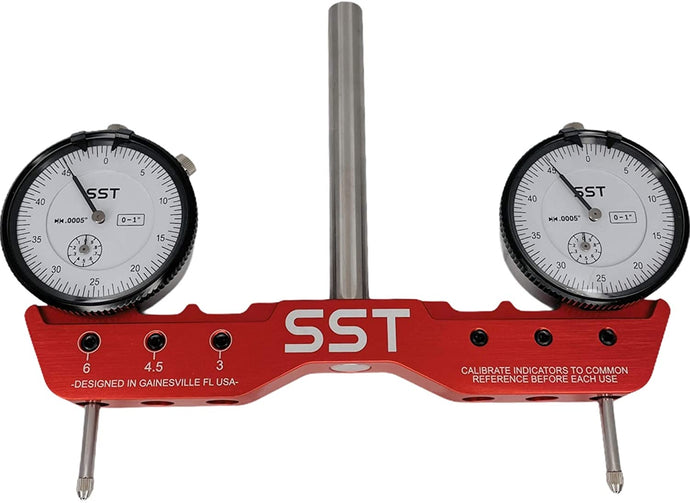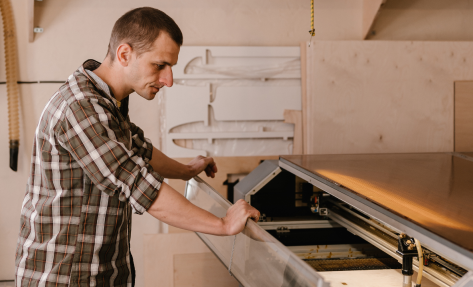SST Shop Talk
When To Make Way For CNC

This holds true for businessmen who are contented with being small-time (though it's hard to find one). However, for businesses that are aggressive towards getting ahead, acquiring a CNC machine seems to top their list of priorities.
CNC stands for Computer Numerical Control. A CNC machine is a computer "director" which is composed of machine tools that read a specific set of instructions (in G-code) and is able to perform certain manufacturing tasks repetitively. The top industries that use the CNC technology are the Metal and Woodworking industries.
If you are a regular member of a techie forum for entrepreneurs, CNC may be showered with praises because of its performance. Most businessmen also swear by saving a lot of money and time when they started employing CNC technology in their production processes. However, if you are still considering CNC at the expense of the jobs of your employees, it is best that you prefer CNC at two levels: the logical level and the emotional level.
LOGIC-WISE
CNC machines do specific instructions. They will never assume anything, nor rebel against the program loaded to them. Imagine the security of knowing that you will "reap" exactly what you "sowed". Let's say, something goes wrong during the process. Assuming the machine is in perfect condition, you CANNOT put the blame on it because it just performed what you told it to do so.
Secondly, there is the blanket of consistency. It provides a certain level of safety and ease to the head supervisor. If you have overseen the operations today, most likely, it will be exactly the same tomorrow. The feeling of knowing what to expect is always a good thing, especially when there's money involved.
Lastly, there's speed. CNC machines do not stop to think. After you do the thinking, they do the power-jobs that they need to do. Itís that simple. There is a minimized set-up time and back-job time pocket.
What you will find a flaw about CNC though, is that logic-wise, CNC machines cannot think of better ways to perform a task (IF there is a better way). A CNC machine is purely mechanical; when it was sold to you; the salesmen never mentioned the word "creative" or "innovative". I hope you did not miss that.
EMOTION-WISE
CNC machines are also assets of the company. When assets like this are purchased, there is little or no emotional investment that goes with it. You won't even train it! It is expected to do certain tasks and that is saving you a lot of time from all the explaining, demonstration and reminding.
Also, when a CNC machine is performing its task, it is void of any emotion. So no matter how hot the weather is, or how noisy the workplace is, the CNC machine will do its job just like any other day. It is different as compared to people - who have the tendency to space-out when doing very mechanical and tedious jobs.
Although the CNC may want to, it also cannot complain. That's really convenient. What you will need to note now is your electric bill. Beware, for when getting CNC machines, it may betray you in the form of lofty bills. That being said, the productivity of a CNC machine is well worth the electric bill! As CNC technology continues evolving rapidly, staying informed about upcoming machining tools and innovations can help you make strategic equipment decisions that maximize your investment return.
The Programmer
The first person is the CNC programmer. He is like the "playmaker". He will create the programs that the CNC machines are intended to execute. Since the programs are in the form of CNC codes fabricated like sentences, he should have mastered these codes because they work like a different language. The regular CNC machine can use up to 50 codes, so that's like learning 50 new words for the newbie.
Also, the programmer should have at least and engineering or machining degree. Remember that the CNC machine will only execute WHAT IT IS PROGRAMMED TO DO. If the program is wrong, the whole operation goes down the drain with it. Moreover he should also be flexible and have a fast turn-around because a CNC machine is often used to machine a huge selection of different work-pieces.

The Technician
The third person that will need is the CNC technician. Although this may still be the programmer, it is more convenient to always have a technical expert on-call because in the long run, you may have more than one CNC machine and you may need to prioritize over the other in case both gets crippled at the same time. Just like the programmer, the technician should also be flexible and articulate. CNC offers a lot of complexity when it is running right, how much more if it is behaving badly?
So, if you are having job openings for positions that need to be handling a CNC machine, ask the applicants first to do a demo for you and make sure that during the demo, they know what they're doing. An exam may also do wonders too. If they have no experience with any kind of CNC machine, it is advisable that you encourage them to take short courses on CNC.
Eighty-hour courses are available online and hey, it is better than nothing. Experts even encourage employers to hire CNC machinists who have finished AND PASSED the National Occupational Competency Testing Institute (NOCTI) assessment just so they could be sure that their CNC machines will go to good hands. After all, a CNC machine is still an asset.

The Operator
The second person that you need is the CNC operator. He will simply recheck the programs loaded to the machine and push the right buttons to get the work done. However, thinking that a CNC operator can have little or NO SKILL AT ALL is wrong. A CNC machine operator must have at least basic machining skills and he should have undergone some form of training to run a CNC machine.
These machines can produce very intricate motions, making it possible to make shapes that cannot be created on conventional machine tools. So, the operator should foresee this complexity and know how to cruise with it. The skills that an operator must have though, are lesser compared to the operators of conventional machine tools.



